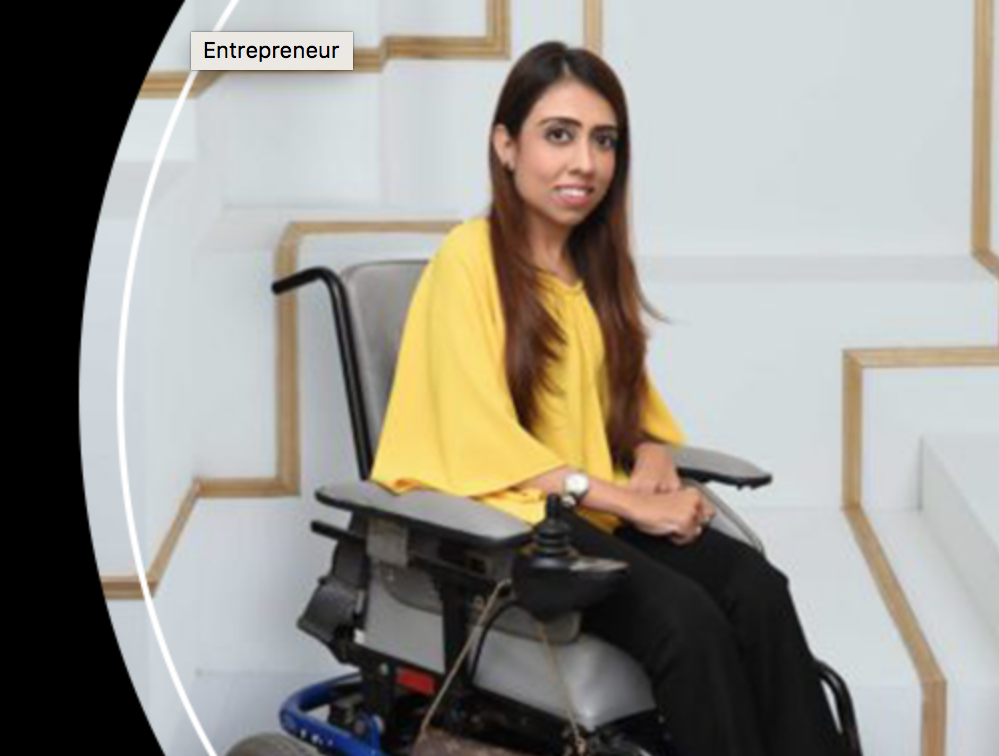
Pond’s Miracle Women 2018 – Social Activist
Farhat Rasheed was born with Cerebral Palsy, a disease that has left her bound to a wheelchair and allows very limited movement of the limbs. Instead of bowing under the pressure of such intense physical limitations, Farhat has proven time and again that the human spirit is capable of rising above all obstacles. She has excelled in every field she chose to pursue. Obtaining a Gold Medal in MBA, working as Brand Manager at one of the most prestigious multinationals in Pakistan, heading Marketing and Operations at the Westbury Group of Companies, and creating the SYC platform that works for making Pakistan wheelchair accessible; Farhat has shone brightly in each role. “The attitude in Pakistan towards people in wheelchairs is that they cannot do anything,” laments Farhat. “Special children are not disabled; they are differently abled. They bring their own unique flavor to work. People think that they won’t be able to deliver at work or they won’t be able to take normal school classes but that is not true.”
Farhat feels very strongly about accessibility. “Restaurants, universities, schools, cinemas, wherever you go there are no arrangements made for wheelchairs. Has anyone seen a wheelchair sign anywhere to indicate that there is arrangement for physically handicapped people? Why should I be carried around by others? I only go to places where I am able to move around myself because it is a basic human right. I don’t need to be dependent on the sympathy of someone else.” Farhat believes that people are not aware about the numbers affected by this issue. The reason we don’t see people in wheelchairs is not that there are very few of them, but because they are trapped in their homes. Farhat narrates the story of a women she met who had a son with leg braces. The child had no cognitive disabilities but no schools were giving admission to him because it would have meant making special arrangements for the child and doing anything extra is considered a hassle. At the behest of Farhat, the child’s therapist went to a school herself to fight the case for the child and eventually he got admission. Stories like these re around us everywhere but people are only willing to give their sympathy, not their support.
After education, Farhat believes that employers have a huge role to play in the life of physically handicapped people. “I was fortunate enough to get into Unilever which was my dream. The good thing was that people treated me like anyone else. If I had to travel for work I travelled, there were no excuses. It made me more confident. My teams were supportive of the fact that I had to leave early for daily physiotherapy. So there was support for my problems but no discrimination when it came to merit.”
Farhat talks about her mother and how it would have been easier to hire two maids instead than invest extra time to care for her special child. “She was the one who was up at nights. There was not a single day when she didn’t drop me to school herself. She gave me the most attention out of all my siblings. Even today there are times when I get low but she gives me the courage to keep going.” For Farhat, her mother is the Miracle Woman. When Farhat couldn’t participate in outdoor activities during P.E. period, her mother would drives Farhat’s wheelchair around, pushing it from behind to make her feel like she is outside in the sun playing just like the other children.
Farhat’s Miracle moment was definitely getting into Unilever, especially after her university career office kept telling her to come and work for IoBM in admin as it would be extremely difficult for her to get a job with her condition elsewhere. “In other interviews I was told I wasn’t compatible for the jobs because I couldn’t travel on trains or couldn’t relocate to other cities considering my ongoing treatments. Unilever was open about letting me make my own path. Pakistan needs more companies like this.”
Farhat is a true inspiration to everyone. Not just people who are physically handicapped but any woman who is struggling with obstacles in life. We need to look up to women like Farhat who aren’t afraid of fighting for their own rights and are confident enough to raise their voice when society is shushing them down. Her life and her ongoing journey are everyday miracles that need to be celebrated.
Published on Pond’s Miracle Women